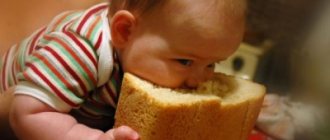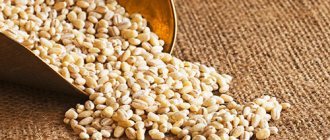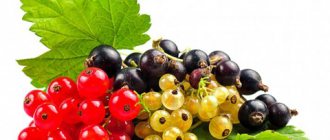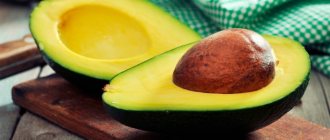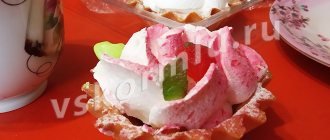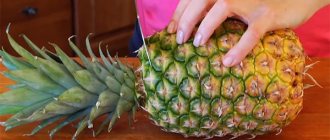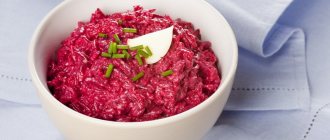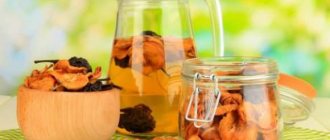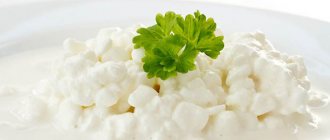Benefits and harms
Bread is the most common flour product, so many nursing mothers are interested in the benefits and harms of the product. It contains a large number of useful substances (high content of B vitamins, mineral compounds, vitamin E). It also contains complex carbohydrates, vegetable protein, and a small amount of fiber.
The positive qualities of the product in question include:
- Increased muscle tone.
- Maintaining elasticity and healthy appearance of the skin.
- Prevention of cellulite.
- Strengthening the central nervous system.
- Saturating the body with energy.
- Normalization of the functioning of the digestive tract.
- Helps in cell renewal.
- Improved mood.
- Increasing stress resistance, eliminating depression.
However, it is worth considering that the benefits of baking depend on the type of flour used.
Despite the many beneficial properties, consuming such a product during lactation can negatively affect the health of the baby/mother. The harm of bread during breastfeeding is:
- Increasing the likelihood of gaining unwanted kilograms (if consumed in excessive quantities), since the product in question has a high calorie content.
- The appearance of discomfort in the abdominal area after eating a piece of rye bread. This may be due to a deficiency of certain enzymes.
- Indigestion if the technology for manufacturing the product was violated or the product was stored improperly.
- The possible occurrence of an allergic reaction in an infant, which may occur due to the addition of chemical compounds to improve the taste of the product or increase its shelf life.
During lactation, young mothers are highly discouraged from overeating, which can negatively affect the baby’s well-being and the woman’s weight.
How to choose the right bread
During breastfeeding, nursing women should be especially careful when planning their diet. After all, everything that a mother eats penetrates into the child’s body with the help of breast milk.
We recommend reading: Breast care before and after breastfeeding
Before consuming a flour product, you should familiarize yourself with the recommendations for its selection:
- Lightly squeezing will leave an indentation in the uncooked product. If the baked goods are completely ready, they will take their previous shape.
- Foreign odors (spices, baked goods) in a rye product indicate the use of artificial additives that can provoke the development of allergic manifestations in infants. You should not buy or eat such bread while breastfeeding.
- If a woman observes too large pores in the crumb, this means the addition of chemical compounds during the manufacture of the product, which are aimed at activating yeast. Such food is harmful for nursing mothers.
- The shade of the product must be uniform over its entire surface, only the crust on top may be darker.
- Also, before purchasing baked goods, you need to familiarize yourself with its expiration date. You should not purchase a product that has been on the counter for a long time. Unnoticeable mold may form in it.
Breastfeeding women should take into account that “yesterday’s” bread made from wheat flour helps stimulate digestion. You can make crackers from it at home. However, they should not be used by those who suffer from:
- flatulence;
- disturbed intestinal microflora;
- gastritis;
- ulcerative lesions of the stomach or duodenum;
- colitis;
- diarrhea.
Freshly baked product, on the contrary, has a fixing effect, so it should not be eaten by mothers suffering from constipation.
Types of bread and what kind is possible during breastfeeding
Not all flour products are allowed for women while breastfeeding, especially in the first months of the baby’s life. You should not eat baked goods containing various spices, which can lead to changes in the taste of breast milk, as well as to the development of allergies in the baby.
Types of bread:
- White. Made from wheat flour, water, yeast with the addition of vegetable oil and table salt. It is allowed to be introduced into the mother’s diet from the first months of the baby’s life. Eating white bread should start with a small dried piece. In the absence of any negative manifestations in the baby, a nursing woman can introduce a fresh product.
- Rye. It is not recommended to eat in the first month after childbirth, as well as if there are problems with the functioning of the gastrointestinal tract. Black bread during breastfeeding can cause increased accumulation of intestinal gases in the baby, colic, and increased stomach acidity. Once your child reaches two or three months of age, you can include homemade rye crackers in the menu. This product contains more beneficial compounds than baked goods made from wheat flour. After 3 – 4 months. After childbirth, it is allowed to eat regular black bread, then the children’s gastrointestinal tract will become stronger and adapt to the new food.
- Grey. Has high acidity. The calorie content of gray bread is low, so this type of product is recommended for consumption by women who want to lose excess weight.
- Corn. Pediatricians recommend that young mothers eat this type of bread during lactation, since corn flour rarely provokes allergies in infants. However, to make such bread, many manufacturers use wheat flour, as well as a large number of chemical elements that give the finished product airiness, pleasant taste, and color. Therefore, in the first months of a baby’s life, it is better for nursing mothers to avoid eating store-bought corn bread.
- Malt. This pastry is prepared from a mixture of wheat and rye flour. Malt is also added, which gives the product softness, fluffiness, and enriches the bread with useful compounds. You should start introducing malt products with a small slice (from the first month of lactation). If the child is feeling well, the mother can eat this product once every 2 to 3 days.
- Bread with bran. This type of baking is rich in fiber (about 80%), minerals, and is allowed for consumption from an early age. This bread will help normalize the functioning of the digestive tract.
- Wholegrain. It is made from wholemeal flour with the remains of grain shells and germs. Grain bread during gw, like the previous one, helps stimulate digestion.
- Pita. You can eat it from the first days of your baby’s life. Thin lavash does not have any effect on the digestion of a newborn, since it does not contain yeast and is prepared from flour, water with the addition of table salt. It is advisable to dry fluffy baked goods before eating.
- Yeast-free. Made from yeast substitute, a yeast-like substance obtained from hops. Yeast-free bread can be replaced with regular bread if your baby has digestive upset due to yeast.
- Baked goods (loaves, buns, buns). These bakery products are allowed for consumption during breastfeeding in limited quantities, starting from the age of three months. However, if an allergic reaction develops in an infant, the introduction of the product should be discontinued.
We recommend reading: Relief during breastfeeding
You can also eat bread for nursing mothers , which helps cleanse the intestines. However, it is worth choosing a product that does not contain various additives.
Which varieties should you prefer?
Black bread is considered to be the most harmless. It is baked from rye flour, which has a good effect on the circulatory system, digestion and heart function. Rye bread fills the body of mother and baby with vitamins PP, B and E. “Borodinsky” bread is very useful for nursing mothers. It does not have harmful additives, and the cooking technology preserves everything useful. Cereals contain vitamins, minerals and amino acids.
Bran bread is also good. It is rich in fiber and vitamins B and E. This product is especially recommended for women who suffer from constipation after childbirth.
Daily bread consumption rate
The permitted volume of bread during breastfeeding depends not only on the condition of the baby, but also on the woman’s body weight. If the young mother’s weight is normal, then she can eat the product as usual. If there are extra pounds, a nursing mother is recommended to eat no more than 1 - 2 slices per day. in the first half of the day. To prevent excess weight gain, you should limit your consumption of flour products in the evening, especially at night.
After introducing the baked goods, you need to monitor the child’s condition for 2 days. If the baby tolerated unfamiliar food well, the nursing woman can continue eating bread. If negative signs or allergies appear in an infant, flour products should be excluded from the mother’s menu. Each type of bread should be introduced separately.
Choosing white bread for nursing mothers on the counter
So, what should a nursing mother pay attention to when choosing baked goods? Here it is important to choose the best baked product, so as not only to enjoy the taste yourself, but also not to harm the baby.
- Please pay attention to the deadlines. This is important if the composition contains biological products, such as eggs. Also, mold may already appear in an expired product, which is not yet visible, because they are usually stored in plastic bags.
- The bread must be baked. Checking this is very simple - just squeeze the loaf a little, if it regains its shape, then everything is fine. But due to the raw dough, it may remain deformed.
- If possible, check how large the pores of the crumb are. If they are quite large in ordinary bread, then this indicates too much yeast activity or additional stimulation. Sometimes such a product can even give off an unpleasant taste of excess yeast. All this is not useful for the mother and is contraindicated for the newborn.
- No foreign odors should be heard from the loaf , because this indicates the presence of components to enhance the taste. Most often they are of artificial origin, so they can become an allergen for the baby.
